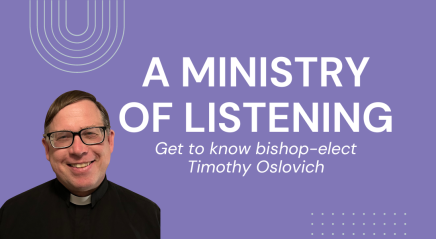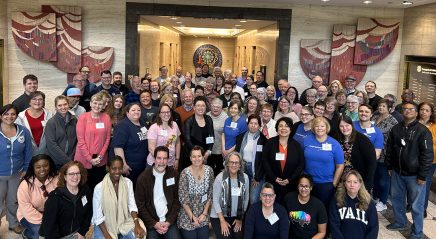In today’s world, we can easily feel overwhelmed and unheard as social media, text messages and 24-hour news inundate us daily. Even church can often feel like a place of telling—or preaching—rather than one of listening and hearing.
A recent study by Future of Faith found that feeling heard has a significant impact on faith formation. Among both adults and teenagers, 8 in 10 survey respondents said listening was important to the moments that shaped their faith the most; 65% of adults and 71% of teenagers said that being listened to has deepened their faith.
At the same time, those surveyed indicated that their trust in people and organizations of authority has diminished, with only 26% of adults and 16% of teens trusting large organizations such as churches. Only 33% of teens and 34% of adults report that hearing a sermon deepens their faith.
Many across the ELCA are trying to change that, focusing on building empathy through sacred listening as a way of solving problems and developing stronger faith relationships.
“There are many ways we can build empathy, but the goal for me is always to get closest to the person or community that’s closest to the challenge we’re trying to solve,” said Emilie Moravec, ELCA innovation partner for organizational innovation. “We have to start listening in that place before we can be creative or think of solutions.”
ELCA Innovation has developed an interview guide that outlines the role of sacred listening in ministry.
The Congregations Lead Initiative (CLI), an ELCA Innovation program currently in its third cohort, equips congregations with tools to spark a renewal of congregational ministry and community partnerships. Moravec believes listening has been a key component of the initiative.
“They’re encouraged to listen to their community, and sometimes that looks like interviewing their church community, and sometimes that means looking externally into the surrounding community,” she said. “Listening can be just observing. It can be walking around your neighborhood and paying attention to what you’re seeing and hearing—that awareness and presence in your neighborhood.”
Through the initiative, ELCA Innovation has developed an interview guide that outlines the role of sacred listening in ministry, offers case studies of some of the initiative’s participating congregations and poses questions to guide listening sessions.
That last part is particularly important, Moravec said, because the questions asked and how they’re asked can significantly impact not only the answers given but the comfort level of the person being interviewed.
“We always say, ‘Use open and curious questions,’” she explained. “So instead of saying, ‘Why did you do that?’ you can try ‘What was that like for you?’ You want to invite the stories and get people’s context and real, lived experience.”
“Listening is the new evangelism”
Bryan Penman, bishop of the Southeastern Pennsylvania Synod, believes such listening extends beyond simple conversations. He said sacred listening is rooted in postcolonial work, repositioning the church as being not the only entity with a story to tell.
“We’re beginning to hear how the church’s impact on a wide array of unchurched people affects its relationship with those who have yet to discover Jesus,” Penman said. “Listening is the new evangelism, and it’s really about inviting people to think about ‘How does your whole life speak to what it means to embody the good news?’”
Penman said meeting people where they are and resisting the urge to speak are critical to truly hearing the thoughts and feelings of others.
“We’re constantly in transmit [mode], and we’re rarely in receive [mode],” he said. “A lot of this has come to me doing anti-racism work. Rev. Dr. Yolanda Denson-Byers writes a lot about how white people listening authentically to BIPOC (Black, Indigenous, people of color) voices need to just listen and not transmit.”
Listening without judgment plays an important role in that practice. Future of Faith’s research found that 67% of teenagers and 66% of adults say their faith deepens when someone listens to them without judgment.
“When you’re listening to someone talk about the important things in their lives, they have to be able to do that from a vulnerable space,” said Josh Packard, co-founder of Future of Faith and an ELCA member. “The minute somebody feels like you are judging their decisions, actions, behaviors, thoughts, any of that, you lost that space. Judgment is the antithesis of relationship in this modern world.”
Packard has found that practicing engaged listening—asking thoughtful follow-up questions, checking in after the discussion and expressing a level of care—can lead to ongoing conversations and stronger faith relationships. According to Future of Faith’s survey, 73% of adults and teenagers reported that when they feel listened to in conversations about faith, they feel more open to future conversations about spirituality with that person.
“I firmly believe God gave most of us two ears and a mouth to listen twice as much as you speak.”
Similarly, 76% of adults and 65% of teenagers said that the best way to encourage someone to integrate faith into their daily life is to ask reflective questions about how their faith relates to their life challenges.
“The act of listening attentively to somebody has profound impacts on their faith lives,” Packard said. “And listening is not an intermediary step to build up trust so that you can tell them what you want to tell them. The act of listening deeply and attentively and then [maintaining the relationship]—that is, in itself, an entire ministry.”
Proponents of the practice stress the importance of taking the time to think about what a person has said before composing the next question or response, rather than giving a reply that feels rehearsed or shifting one’s attention from listening to immediately responding.
“Give the person talking a moment to finish and breathe before you respond,” Moravec said. “Let there be silence, and practice listening without fixing.”
Penman agreed, advising people who embark on a sacred listening journey to become comfortable with silence, even when it feels hard.
“A big part of it is acknowledging that uncomfortable silence is OK,” he said. “And that’s going to feel odd at first, but I firmly believe God gave most of us two ears and a mouth to listen twice as much as you speak. The spiritual practice of listening authentically is hard, and you have to accept that.”
Moravec points to the passage in Luke 24 where Jesus joins two people walking, asks them what they were discussing and then takes the time to hear their feelings and concerns.
“It’s this accompaniment that’s the ministry itself—Jesus just stood and listened,” she said. “[In the CLI,] we base our listening practice on this because that is what we’re called to do: walk alongside people, understand their context, hear their story. We don’t judge, we don’t fix, we just listen.”











